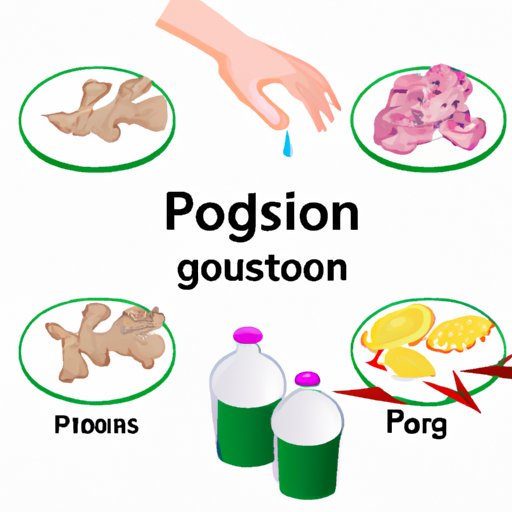
Introduction
Food poisoning is a common condition that affects millions of people every year. Whether it’s from improperly prepared food or contaminated products, food poisoning symptoms can range from mild to severe and can last for days. It’s important to take steps to recover quickly and prevent future bouts of food poisoning.
Hydration is Key
Hydration is essential for recovering from food poisoning. Vomiting and diarrhea can cause dehydration, which can make you feel even worse. It’s important to drink plenty of fluids to replenish your body. Water is the best option, but you can also try coconut water, electrolyte drinks, or vegetable broth.
Stick to Bland Foods
Bland, easily digestible foods can help soothe your digestive system. Stick to foods that are easy on the digestive system, such as white rice, plain toast, and bananas. Avoid spicy, oily, or greasy foods until you feel better. It’s important to not eat too much at once to avoid overwhelming your digestive system.
Rest and Relax
Rest is essential for recovery from food poisoning. Your body needs time to heal, and you don’t want to overexert yourself. Avoid strenuous physical activity, and try to get enough sleep at night. If possible, take a day or two off from work to focus on your recovery.
Consider Probiotics
Probiotics are good bacteria that can help restore the balance in your gut. They can be found in supplements or fermented foods like yogurt or kimchi. Adding probiotics to your diet may help speed up your recovery.
Try Ginger
Ginger is a natural anti-inflammatory that can help soothe digestive issues. You can incorporate ginger into your diet by drinking ginger tea or taking ginger supplements. Ginger ale may also help settle your stomach, but make sure to choose a brand that contains real ginger.
Seek Medical Attention
Most cases of food poisoning can be treated at home with rest and hydration. However, some cases may require medical attention. Seek medical attention if you experience severe symptoms like high fever, blood in your stool, or extreme dehydration. Pregnant women, young children, and elderly adults may also be at higher risk for complications from food poisoning.
Stay Vigilant
The best way to avoid food poisoning is to practice food safety. Wash your hands before cooking and eating, cook food to the correct temperature, and store food properly. Avoid eating raw or undercooked meat, and be careful when eating at restaurants or food trucks. If you suspect that a food may be contaminated, don’t take the risk.
Conclusion
Recovering from food poisoning can be a challenging process, but there are steps you can take to speed up your recovery. Stay hydrated, stick to bland foods, rest, and consider adding probiotics or ginger to your diet. If your symptoms are severe, seek medical attention. And remember to practice food safety to avoid future bouts of food poisoning.





